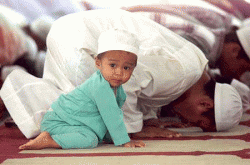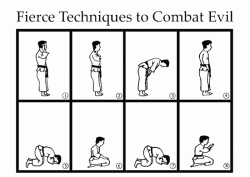2: Daily Prayer and Supplication
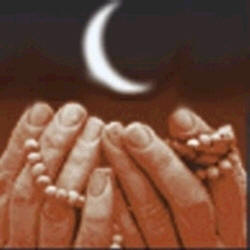
See Also A Muslim Praying Underwater!
Importance of Salaah:
Salaah is the five times daily prayer performed for Allah and is obligatory (Fardh upon each and every Muslim. It is a command of Allah and has tremendous rewards and is the very first thing, which Muslims must account for on the Day of Judgement. The Salaah prayer reminds a Muslim throughout the normal, busy, worldly routine that they are Allah’s creation and will one day return to Him, and just like the Shahadah (declaration of faith), Salaah brings out the unity in the Ummah(worldwide Muslim community) as it is prayed at the same time by the same people, in the same language, with the same actions for the same God: Allah.
Very Brief History of Salaah:
The Salaah was a gift given to the Prophet (s.a.w.) as he went on a Journey to meet Allah, known as Mi’raj. When the Salaah was first revealed, it had to be performed fifty times a day but was reduced to only five times a day as the Prophet (s.a.w.) knew that Muslims would find it difficult to establish such a frequent prayer, and therefore he appealed to Allah.
In earlier times, Muslims would pray facing Jerusalem, however, several months after the Miraj, the direction of prayer was changed to the Ka’aba (Quran 2:125-127). Jerusalem is thus called Ula al-Qiblatain (the First Qibla).
As a Muslim Magazine called 786 interestingly says, “…the Bible says that the early Israelites in Jerusalem used to turn to the Southern direction when making their most sacred prayers and offerings (Exodus 27:9; 40:24). The Ka’ba is in the southern direction of Jerusalem.”
Adhaan: The Call To Prayer
At prayer time, and before the actual prayer, the Leader of every mosque (Imam) is obliged to call out to the Muslims as a reminder that it is prayer time. The actual call is called the Adhaan and consists of several phrases in Arabic. In the time of the Prophet Muhammad (s), the Imam's would climb to the Minaret of the Mosque and shout the call from there.
To hear the adhaan in Madinah, watch the brief video below. (The adhaan/Call to prayer is the same everywhere in the world).
Conditions of Salaah:
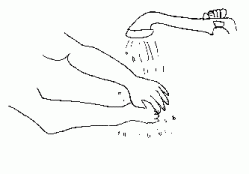
ABLUTION:
(Click on the picture to see other pictures of how to perform ablution).
This is known as wudhu in Arabic. Muslims must ensure they have ablution before praying. The actions of ablution include the washing of the private parts, washing the arms up to the elbows, washing the face from the top of the forehead to below the chin and from one earlobe to the other, gargling, cleaning one’s nostrils, passing water over the neck and hair (known as Masaa), and finally washing both feet.
Ablution is broken by passing wind, passing faeces or urine, or by flowing blood, which, for example, can be due to a nosebleed. Women are not obligated to pray Salaah during menstruation.
Other Necessities:
“We see the turning of thy face (for guidance) to the heavens: now shall We turn thee to a Qiblah that shall please thee. Turn then thy face in the direction of the Sacred Mosque: wherever ye are, turn your faces in that direction.”
(Al-Quran 2:144)
A Muslim must face the Ka’aba (a small, cube-shaped mosque in Makkah, Saudi Arabia, which holds great significance for Muslims) for Salaah. This is also referred to as the Qibla’. Muslims must also wear clean clothes and ensure that their body is covered respectively according to their satar(the area for males and females that must be covered). They must also try to appear clean inside and in mind as they face their Creator.
Note: Salaah can only ever be prayed in Arabic. The reason for this is because if the words were translated into another language, then the meaning may also change. However, other prayers can be offered without the need for ablution, in any language and can be offered anywhere, by simply raising and joining the palms together, praying a Durood-Sharif(prayer sending blessings upon the Prophet (s)) thrice and then asking for whatever one wants.
When is Salaah Prayed?
The five daily prayers have specific timings and names. They are:
1) Fajr: A morning prayer which can be prayed after dawn to just before sunrise, and consisting of 4 Rakaats (units of prayer)
2) Zuhr A midday prayer which can be prayed immediately after the Sun begins to decline until mid afternoon, and consisting of 12 Rakaats(units of prayer)
3) Asr:A late afternoon prayer which can be prayed after mid afternoon to twenty minutes just before Sunset, and consisting of 8 Rakaats (units of prayer)
4) Maghrib:An evening prayer which is prayed just after sunset until it is dark, and consisting of 7 Rakaats (units of prayer)
5) Ishaa A night prayer which can be prayed from one and a half hours after Sunset to approximately midnight, and consisting of 17 Rakaats (units of prayer)
Apart from the obligatory prayers, there are other special prayers such as Ju’ma Salaah, which replaces Zuhr every Friday, and is only for men. Women pray the normal Zuhr Salaah. Similarly, there are special prayers on the festivals of Eid and extra Salaah’swhich can be prayed for reward or when feeling that one needs guidance. However, it is important to note that if the Obligatory prayers are not followed, then any extra (nafl) prayers will not be accepted.
How is Salaah prayed?
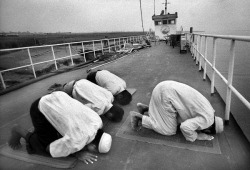
As mentioned above, Salaah is the five time daily prayer performed by Muslims for Allah, but for those who don’t know what I am referring to, ever seen people standing in rows in a mosque and often going down into a prostrating movement? That is Salaah.
The exact actions of Salaah are the same. In brief: Both men and women start off in a standing posture, followed by a deep bow and then progressing to a sitting position on the knees. The person then touches their forehead to the ground, sits up and repeats the process before finally standing again. This is known asOne Rakaat, i.e. one unit of prayer The action of touching the forehead on the ground, i.e. prostrating, is called a Sajdah.
There are certain minor differences between the Salaah prayer of a man and the Salaah prayer of a woman, but I will not be going into detail regarding these as this is meant to be kept basic and concise. Along with this, there are a few other actions, which are considered as extra, such as making an intention before actually starting the Salaah. An example of such an intention (Niyyah) is, “I am going to pray two Raka’at Zuhr Salaah for Allah, facing the Qibla.” This is followed by the declaration ‘Allahu-Akbar’‘Allah is the Greatest’ after which the Salaah officially begins.
The Salaah ends with the person in a sitting position, who first turns their face to the right, keeping their eyes lowered, and reciting ‘Assalamu-alaykum-wa-rahmatu-Allah’: ‘May Allah’s peace and blessings be upon you’, and then rotating their face to the left and saying the same thing again. Here, the Muslim is asking for peace and blessings to be upon those around them, and everyone in the world (to their right and left). After this, the Salaah ends.
Significance of Postures:
The postures in Salaah represent the qualities of a Muslim showing gratitude, reverence, modesty (by covering themselves respectably and according to the boundaries of satar for both men and women), humility (shown through the different positions of lowering oneself) and submission (shown by standing fully upright to show full concentration and respect for Allah).
What is actually prayed in the Salaah?
The Salaah often consists of the recitation of Surah Fatiha: ‘The Opening’ of the Quran and is followed by another Surah (Chapter) of the person’s choice. This is recited when a Muslim is standing. Various phrases are recited whilst prostrating, but when the Muslim is sitting, what is prayed varies according to what a Muslim wishes to pray.
The translation of Surah Al-Fatiha: “Praise be to Allah, Lord of the worlds; Most Gracious, Most Merciful; Owner of the Day of Judgement. You alone we worship and You alone we ask for help. Show us the straight path; the path of those whom You have favoured; Not the path of those who earn your anger nor of those who go astray.”
It has been narrated that the Prophet (s.a.w.) reported that Allah says: “When my slave says in his prayer: All praise is for Allah, the Lord of the Worlds, I say: My slave has praised Me. When he says: The Merciful, the compassionate, Master of the Day of Judgement, I say: My slave has glorified Me. When he says: You alone we worship, and your aid we seek, I say: This is between My slave and Myself. When he says: Show us the Straight Path, I say: This is for My slave and I give My slave what he wants.” (Hadeeth Qudsi)
When sitting, some Muslims usually recite tash-hud, Durood-e-Ibraahim and a Du’a (Prayer). These are prayers in Arabic requesting for peace and blessings to be sent upon Muhammad (s.a.w.) and the Children of Muhammad (s.a.w.), just as peace and blessings were sent upon Ibrahim (a.s.) and the Children of Ibrahim (a.s.). Along with this, the Shahadah is also reiterated.
Benefits:

Direct Communication with Allah…
The Quran says, “Establish prayer for my remembrance…”
Muslims believe that Allah is everywhere. Salaah is a Pillar, which must be established for the remembrance of Allah, and as some people, say: this is the chance to communicate directly with Allah.
The Prophet (s.a.w.) has said, “The prayer is the Miraj of the Believer.” This means that every time a Muslim prays Salaah, they are communicating with Allah directly, and it is like their journey of communication.
Prayer is a shield against Evil…
“Prayer forbids from obscenity and evil…” (Quran)
By praying to Allah, and constantly interrupting one’s own life to set aside time to worship and remember Allah, a person is reminding themselves of their own mortality and the existence of God, who constantly watches every single thing that the person does. This leads to stronger faith (Iman) and Taqwaa: sometimes translated as the ‘fear of Allah’ but it is really more of an intense awareness of Allah.
What is Taqwaa?
Taqwaa is an intense awareness of Allah. To explain it better, I will give an example, which was presented to me once. If you love someone, you will do absolutely anything for that person. You will cook for them, clean for them, and as some people claim, you will even die for that person. However, despite all this, you never fear the one you love, but you are always intensely aware of them and of their every action. It is the same case with Taqwaa.
To have Taqwaa, a Muslim must love Allah and appreciate the creativity and power of Allah. By simply fearing Allah, a Muslim does not have any love for their God, but if the Muslim becomes intensely aware of Allah, who is everywhere and who watches every action, then a Muslim would constantly try to better themselves and to act according to the wishes of Allah, which are for people to be pious Muslims and Khalifahs: Guardians of the Earth.
Equality and Unity Developed:
As Muslims pray the same prayer at the same time, they are united in their prayer, which brings about the unity of the Ummah: Worldwide Muslim Community. Similarly, the rows (saf’h) in which Muslims pray are not reserved according to wealth or status as every human being is equal: no one is superior or inferior.
Unity – same time… same people… same language… same actions… same God: Allah
Qualities Developed:
Muslims develop self-discipline and humility by praying the Salaah on time and regularly. Along with this, Muslims become humble and as mentioned above, the Taqwaa and Iman of a Muslim is strengthened.
Rewards:
Each Salaah has it’s own specific reward. These are as follows:
Fajr: blessing in provisions
Zuhr: receives guidance from Allah in his/her heart
Asr: maintains physical power
Maghrib: food will have rich tastes
Isha: blessed with faith (Iman) in the Hereafter
Along with this, Salaah helps a Muslim in the Hereafter to cross the Pulsiraat(a bridge) and protects one from the Punishment of Hell fire.
MEDICAL Benefits:
As an Islamic Newspaper called the Islamic Timesreported in an article entitled “Study proves Muslim prayers have physical benefits,” the actual postures of Salaah do have tremendous physical benefits as well. “A Malaysian University has discovered that the postures used during the Muslim prayer, have significant physical benefits, according to a report released in December 2006,” the article says. “Initial results from a research project by Universiti Malaya’s biomedical engineering department show the Muslim style of praying benefits the heart and spine, while increasing the capacity for memory and attention.”
As Prime Minister Abdullah Ahmad Badawi said, “The study investigates the physiological interactions and effects of the postures on the human body.” He likened the postures to those practised in yoga.
